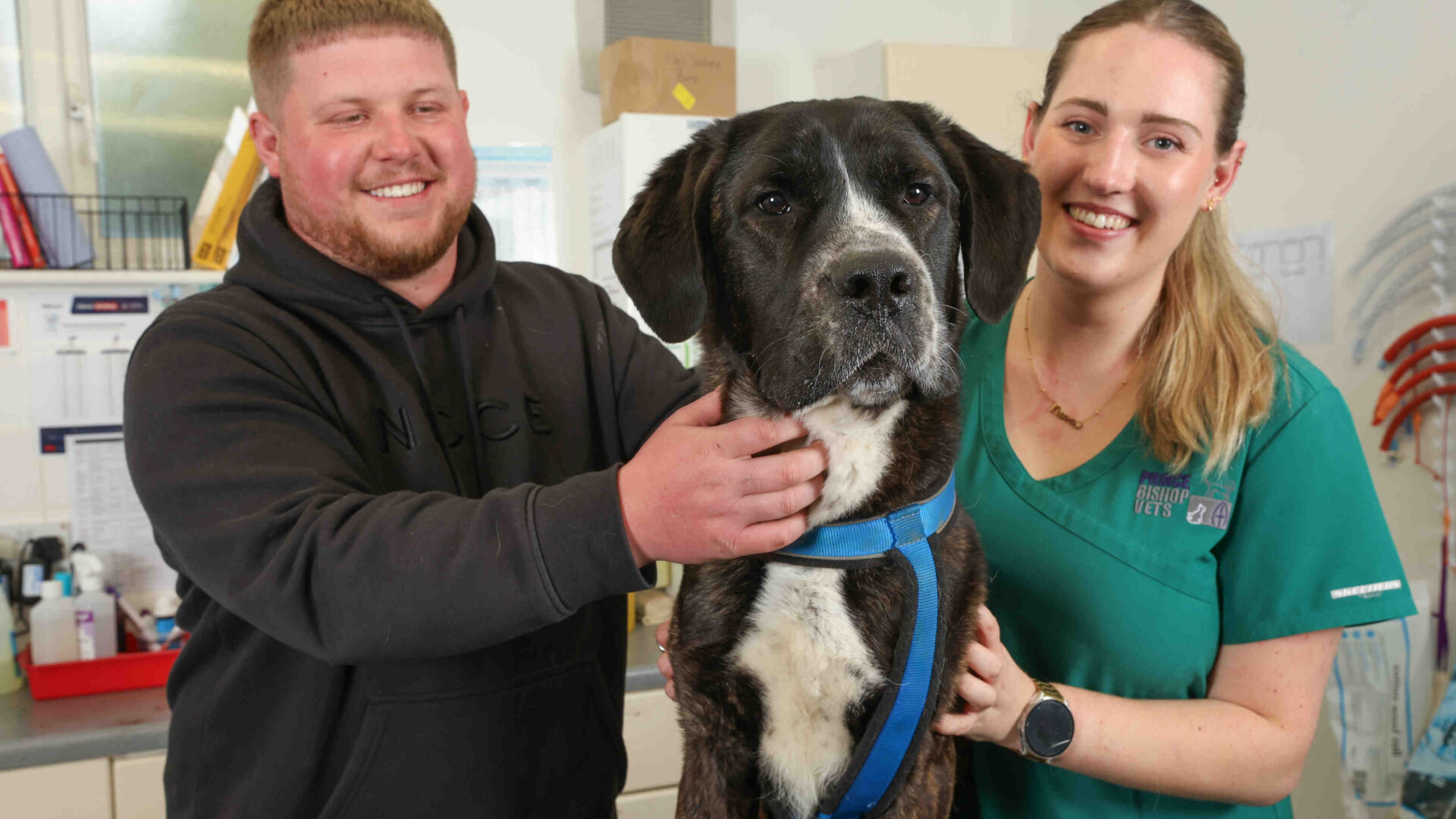A COUNTY Durham veterinary practice has issued an urgent warning to dog owners to keep their Easter treats locked away after a much-loved family pet needed emergency treatment after wolfing down dozens of sweets.
While his owners were out, Jaxon escaped from his cage, prised open a cupboard and stole 66 miniature bags of sweets, before wolfing down the gummy and chewy treats including the wrappers.
When Ryan Stoker and fiancée Chloe Kirchner returned home, they found Jaxon sitting among sweet bags, wagging his tail and looking guilty. After realising how many sweets he had eaten, they took their Cane Corso to Prince Bishop Vets in Leadgate, near Consett.
Eating such a large volume of sweets and their wrappers risked causing an obstruction and an increased risk of bloat in large dogs which can be life threatening.
Jaxon was examined and given an injection to induce vomiting, before he brought up a large amount of sweets and wrappers. Thanks to the care, skills and expertise of vet Dr Emma Hindson and the team at Prince Bishop Vets, Jaxon was none the worse for his exploits but the practice said the case was a timely warning in the lead up to Easter.
Many people will have tempting Easter treats, including sweets, chocolate eggs, hot cross buns and Simnel cake, in their homes – all of which can also be toxic to pets.
Emma said: “If you suspect your dog may have eaten something they shouldn’t have, it is advisable to contact your vet promptly. In most cases, taking appropriate action within the right time frame will prevent the risk of developing more serious symptoms.
“Preventing access to tempting treats they shouldn’t eat is key, so keep the Easter eggs, sweets that contain a toxic substance called xylitol, and hot cross buns, safely out of harm’s way. Don’t underestimate some dogs’ determined ability to get to things they shouldn’t.
“We see chocolate poisoning all year round, but we do see more in high-risk periods like Christmas and Easter, mainly due to the increase in accessibility.”
Ryan bought three 2.5 kilo share bags of sweets, with each pack containing 22 individual miniature bags of sweets, and believes Jaxon deliberately set out to raid the cupboard after seeing where his owners stored them.
Ryan, who lives in Consett, said: “He was left on his own only for half an hour and when I came back we discovered him with opened and ripped bags everywhere. He was just standing there wagging his tail looking happy with himself. We don’t know how he got out of his cage, but he seemed to know exactly where the sweets were.
“I had a moment of panic as I knew straightaway eating so many sweets and wrappers was dangerous. Prince Bishop Vets said to bring him down immediately and they knew exactly how to deal with this and were so helpful.
“We thought the sweets were away from him in the cupboard, but they are now up in a higher cupboard to be on the safe side. He won’t be stealing anything again, any time soon.”
Prince Bishop Vets is advising owners to make a note of their vets’ Easter opening hours and emergency contact information, just in case the worst does happen and they need to seek help quickly.
To help everyone enjoy a happy Easter, Prince Bishop Vets has highlighted eight dangers to pets
- Keep Easter eggs out of reach of your dog as chocolate can cause tummy upsets, hyperactivity, an elevated heart rate and seizures.
- Don’t let dogs eat hot cross buns or Easter cake because the grapes, raisins, currants and sultanas they contain can be toxic to pets.
- Flowers are popular Easter gifts, but they can make pets very ill. Daffodils, tulips and crocuses are toxic, especially if dogs dig up and eat the bulbs, while lilies can cause kidney failure in cats.
- Keep stuffed cuddly toy bunnies and chicks and plastic toys away from dogs because they can be chewed or swallowed, causing choking or blockages.
- Do not give your pet lamb, turkey or chicken bones and be vigilant about them stealing from the Easter dinner table.
- Prevent pets having access to alcohol. It has the same effect on a dog’s liver and brain that it has on humans and is potentially fatal.
- Avoid feeding scraps from the table. Rich, fatty foods can result in vomiting or diarrhoea and lead to an increased risk of pancreatitis, a painful and serious condition.
- Keep onions and garlic – powdered, raw, cooked, or dehydrated – away from your dog. They can cause vomiting, diarrhoea and anaemia.
